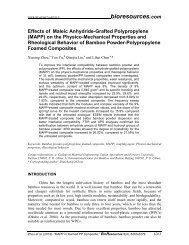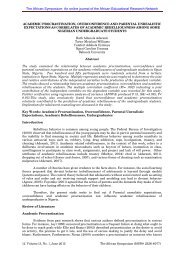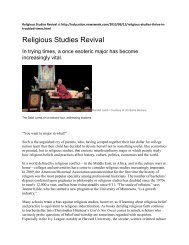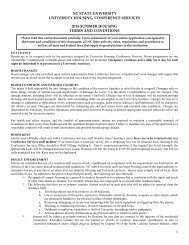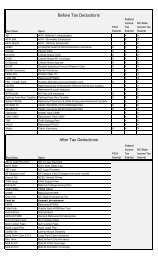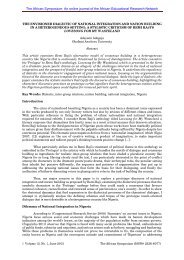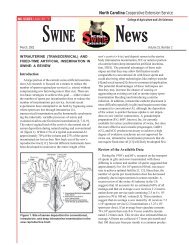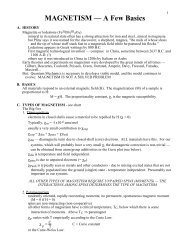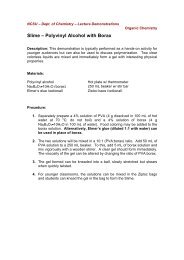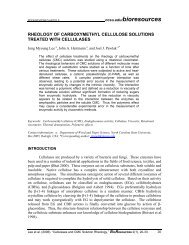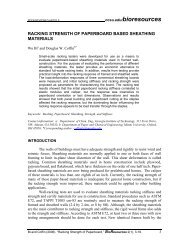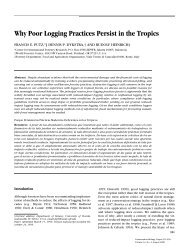Dictators, Songwriters, and the Negotiation of Censorship
Dictators, Songwriters, and the Negotiation of Censorship
Dictators, Songwriters, and the Negotiation of Censorship
Create successful ePaper yourself
Turn your PDF publications into a flip-book with our unique Google optimized e-Paper software.
Starmakers: <strong>Dictators</strong>, <strong>Songwriters</strong>...<br />
The revision replaces <strong>the</strong> obvious conclusion <strong>of</strong> <strong>the</strong> song with one that is<br />
more subtle: it simply describes <strong>the</strong> effect <strong>of</strong> <strong>the</strong> censorship. “La pantalla<br />
que sangra nos dice adiós,” says <strong>the</strong> narrator, but we will see <strong>the</strong> starlet<br />
again, perhaps “en 20 años en televisión, cortada y aburrida” (ll. 28-30).<br />
Even without <strong>the</strong> obvious last verse, <strong>the</strong> song can fairly easily be read as a<br />
parable with a moral. But whereas <strong>the</strong> original ending essentially<br />
guaranteed that <strong>the</strong> song would be banned by censors, in <strong>the</strong> revised<br />
version, <strong>the</strong> poetic discourse makes it ambiguous enough to be accepted.<br />
As stated, simply avoiding <strong>the</strong> descriptive anecdotal form may not<br />
have been enough to escape censorship if <strong>the</strong> discourse was too literal. The<br />
o<strong>the</strong>r song that was completely removed from <strong>the</strong> album in post-<br />
production was “Juan Represión”, also a parable that, like “Señor Tijeras”,<br />
criticizes a political institution. But <strong>the</strong> characterization <strong>of</strong> Juan Represión<br />
uses direct/descriptive language to cast <strong>the</strong> authority/disciplinary figure in<br />
a ridiculous light, <strong>and</strong> recast anger <strong>and</strong> fear toward authority as scorn.<br />
Songwriter Charly García minimizes his military man, Juan, by casting him<br />
as a pa<strong>the</strong>tic superhero wannabe, a doddering old senior citizen who<br />
dresses up in comic book costumes to play cops <strong>and</strong> robbers. But “pobre<br />
Juan” gets it all wrong: “…se disfrazó de bueno con un disfraz de villano / y<br />
los malos de la historia son los heroes cotidianos” (ll. 13-16). As a result, <strong>the</strong><br />
“hombre que quiso ser sobrehumano… está tan loco el pobre que en la<br />
cárcel se encerró” (ll. 29-30). One cannot feel hate toward this sad figure,<br />
only pity that he cannot see how out <strong>of</strong> touch he is: “[p]obre Juan… qué<br />
lástima me das / todos los reprimidos seremos tus amigos / cu<strong>and</strong>o tires al<br />
suelo tu disfraz” (ll. 39-44). This cleverly satirical song was already<br />
recorded <strong>and</strong> mixed, but was not allowed onto <strong>the</strong> finished album. Albeit a<br />
fictional account like “Sr. Tijeras,” <strong>the</strong> rational discourse makes <strong>the</strong><br />
personification too transparent, <strong>and</strong> <strong>the</strong> song crosses <strong>the</strong> line from parable<br />
to caricature. It is far from a hermetic metaphorical depiction: <strong>the</strong><br />
character’s name, identified in <strong>the</strong> song title <strong>and</strong> repeated throughout <strong>the</strong><br />
song, clearly reveals <strong>the</strong> target <strong>of</strong> derision. Fur<strong>the</strong>rmore, <strong>the</strong> lyric voice<br />
clearly <strong>and</strong> directly warns Juan <strong>of</strong> <strong>the</strong> consequences <strong>of</strong> his actions: “esperas<br />
63



